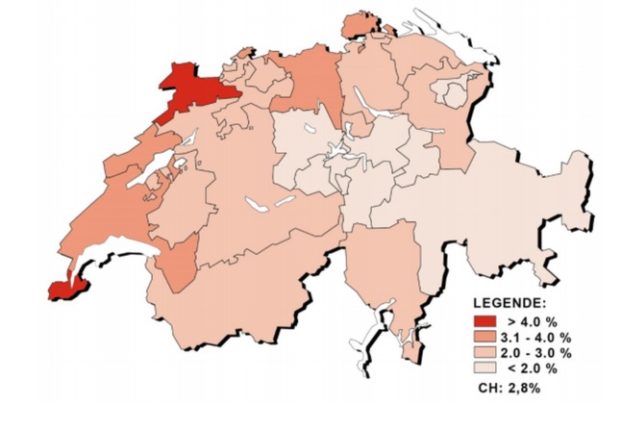Working in Switzerland: A weekly roundup of the latest job news

Find out everything you need to know about working in Switzerland with The Local's weekly roundup of jobs news.
Starting in August 2021, The Local will bring you weekly updates on everything related to jobs and working in Switzerland.
This includes trends, reader feedback and relevant laws that you need to know about when working in Switzerland.
Statistics: Unemployment highest in French-speaking cantons
At the end of July 2021, the overall rate stood at a relatively low 2.8 percent, but some cantons did better than others on the job front, according to figures released this week by the State Secretariat for Economic Affairs (SECO).
As the SECO map below indicates, at 4.9 and 4.8 percent respectively, Geneva and Jura have higher-than-average joblessness, while unemployment rate in central and eastern cantons falls below 2 percent.

The highest rate is among young people up to 24 years of age (+3.7 percent), while unemployment among those between 50 and 64 has declined by 3.2 percent, according to SECO.
Unemployment highest among foreigners
The same SECO statistics show that while the jobless rate for the Swiss is 2 percent, it jumps to 4.8 percent among foreign nationals.
For the EU nationals employed in Switzerland, it is the highest for Eastern Europeans: 10.6 percent for citizens of Bulgaria, followed by Romanians (8.8 percent), and people from Slovakia (6.5 percent).
For those outside the EU, unemployment is highest for people from the Balkans: 7.8 percent for those from Kosovo and 7.1 percent for Macedonians.
The lowest unemployment among the non-EU group is among British citizens: 3.7 percent.
READ MORE: How can I have my foreign qualifications recognised in Switzerland?
Teleworking more popular among Swiss employees
Working from home, a practice which took hold during the pandemic, is seen favourably by most employees in Switzerland
According to a survey carried out by the GFS Institute, 89 percent of employees questioned believe that teleworking should be allowed in their company, in addition to on-site activity.
And 79 percent want to continue this system after the pandemic, while only 6 percent reject this option.
This preference is not one-sided: several large Swiss companies have decided to give their employees more flexibility in the organisation of working time to offer them a better work-life balance.
Among them are UBS and Credit Suisse banks, according to the survey.
READ MORE: ‘Home office’: Will the pandemic change the way Switzerland works?
Digital professions remain in high demand
Highly skilled computer workforce is scarce in Switzerland, but the demand for these services is high.
“It is currently almost impossible to find a mobile app developer", Daniel Kaempf , co-founder and director of Darwin Digital, said in an interview.
To fill the gap, he believes that all sectors leading to digital transformation professions should be strengthened in Switzerland, which, for the time being, are limited and the career path is complex.
“At the moment, the best course is an engineering degree from a federal polytechnic or a university of applied sciences. Then, you have to supplement your knowledge with online training. And above all, you have to gain practice by working”, he said.
Did you know? Switzerland does not have a minimum wage
When compared to its European neighbours – or countries globally – Switzerland is known for its high salaries in almost all industry types.
Therefore, it is perhaps surprising to find out that the country does not have an officially mandated minimum hourly wage.
After being first implemented in New Zealand and Australia in the 1890s, minimum wage laws have spread across the world. Most European countries have now put in place some form of minimum wage limit.
In Switzerland, this has been done at a cantonal level, with five cantons now putting in place a minimum wage: Basel City, Ticino, Geneva, Neuchâtel and Jura.
Zurich, Switzerland's most populous canton, is also considering putting in place a minimum wage.
READ MORE: Will Zurich introduce a minimum wage?
That does not however mean that your employer is free to pay you as much – or as little – as he or she wants. Instead, the minimum amount you can be paid will be determined through negotiations with your employer which will may feature a trade union representative.
Whether this be an hourly amount or one which is set for full or part-time hours, setting a minimum standard in specific industries is a common way to ensure workers aren’t underpaid or unpaid.
More information about the minimum wage in Switzerland can be found at the following link.
Minimum wage in Switzerland: What you need to know
Useful links
Looking for a job in Switzerland or just want a little more information about working here, then check out the following links.
- EXPLAINED: Can you be fired in Switzerland if you refuse the Covid-19 vaccine?
- Moving to Switzerland? How can I have my foreign qualifications recognised?
- Getting fired in Switzerland: The employment laws you need to know about
- OVERVIEW: An essential guide to being unemployed in Switzerland
- EXPLAINED: Which jobs pay the most and least after a Swiss apprenticeship?
The jobs roundup is new addition and we'd welcome any feedback or suggestions for areas it should cover. Please email us at [email protected]
Comments
See Also
Starting in August 2021, The Local will bring you weekly updates on everything related to jobs and working in Switzerland.
This includes trends, reader feedback and relevant laws that you need to know about when working in Switzerland.
Statistics: Unemployment highest in French-speaking cantons
At the end of July 2021, the overall rate stood at a relatively low 2.8 percent, but some cantons did better than others on the job front, according to figures released this week by the State Secretariat for Economic Affairs (SECO).
As the SECO map below indicates, at 4.9 and 4.8 percent respectively, Geneva and Jura have higher-than-average joblessness, while unemployment rate in central and eastern cantons falls below 2 percent.

The highest rate is among young people up to 24 years of age (+3.7 percent), while unemployment among those between 50 and 64 has declined by 3.2 percent, according to SECO.
Unemployment highest among foreigners
The same SECO statistics show that while the jobless rate for the Swiss is 2 percent, it jumps to 4.8 percent among foreign nationals.
For the EU nationals employed in Switzerland, it is the highest for Eastern Europeans: 10.6 percent for citizens of Bulgaria, followed by Romanians (8.8 percent), and people from Slovakia (6.5 percent).
For those outside the EU, unemployment is highest for people from the Balkans: 7.8 percent for those from Kosovo and 7.1 percent for Macedonians.
The lowest unemployment among the non-EU group is among British citizens: 3.7 percent.
READ MORE: How can I have my foreign qualifications recognised in Switzerland?
Teleworking more popular among Swiss employees
Working from home, a practice which took hold during the pandemic, is seen favourably by most employees in Switzerland
According to a survey carried out by the GFS Institute, 89 percent of employees questioned believe that teleworking should be allowed in their company, in addition to on-site activity.
And 79 percent want to continue this system after the pandemic, while only 6 percent reject this option.
This preference is not one-sided: several large Swiss companies have decided to give their employees more flexibility in the organisation of working time to offer them a better work-life balance.
Among them are UBS and Credit Suisse banks, according to the survey.
READ MORE: ‘Home office’: Will the pandemic change the way Switzerland works?
Digital professions remain in high demand
Highly skilled computer workforce is scarce in Switzerland, but the demand for these services is high.
“It is currently almost impossible to find a mobile app developer", Daniel Kaempf , co-founder and director of Darwin Digital, said in an interview.
To fill the gap, he believes that all sectors leading to digital transformation professions should be strengthened in Switzerland, which, for the time being, are limited and the career path is complex.
“At the moment, the best course is an engineering degree from a federal polytechnic or a university of applied sciences. Then, you have to supplement your knowledge with online training. And above all, you have to gain practice by working”, he said.
Did you know? Switzerland does not have a minimum wage
When compared to its European neighbours – or countries globally – Switzerland is known for its high salaries in almost all industry types.
Therefore, it is perhaps surprising to find out that the country does not have an officially mandated minimum hourly wage.
After being first implemented in New Zealand and Australia in the 1890s, minimum wage laws have spread across the world. Most European countries have now put in place some form of minimum wage limit.
In Switzerland, this has been done at a cantonal level, with five cantons now putting in place a minimum wage: Basel City, Ticino, Geneva, Neuchâtel and Jura.
Zurich, Switzerland's most populous canton, is also considering putting in place a minimum wage.
READ MORE: Will Zurich introduce a minimum wage?
That does not however mean that your employer is free to pay you as much – or as little – as he or she wants. Instead, the minimum amount you can be paid will be determined through negotiations with your employer which will may feature a trade union representative.
Whether this be an hourly amount or one which is set for full or part-time hours, setting a minimum standard in specific industries is a common way to ensure workers aren’t underpaid or unpaid.
More information about the minimum wage in Switzerland can be found at the following link.
Minimum wage in Switzerland: What you need to know
Useful links
Looking for a job in Switzerland or just want a little more information about working here, then check out the following links.
- EXPLAINED: Can you be fired in Switzerland if you refuse the Covid-19 vaccine?
- Moving to Switzerland? How can I have my foreign qualifications recognised?
- Getting fired in Switzerland: The employment laws you need to know about
- OVERVIEW: An essential guide to being unemployed in Switzerland
- EXPLAINED: Which jobs pay the most and least after a Swiss apprenticeship?
The jobs roundup is new addition and we'd welcome any feedback or suggestions for areas it should cover. Please email us at [email protected]
Join the conversation in our comments section below. Share your own views and experience and if you have a question or suggestion for our journalists then email us at [email protected].
Please keep comments civil, constructive and on topic – and make sure to read our terms of use before getting involved.
Please log in here to leave a comment.